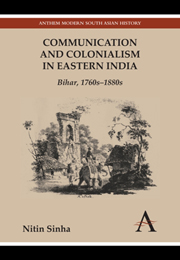Book contents
- Frontmatter
- Contents
- Acknowledgements
- List of Abbreviations
- Glossary
- List of Tables and Illustrations
- Introduction
- Chapter 1 From Affective Forms to Objectification: Spatial Transition from Pre-colonial to Colonial Times
- Chapter 2 India and its Interiors
- Chapter 3 Going into the Interiors
- Chapter 4 Knowing the Ways
- Chapter 5 Controlling the Routes
- Chapter 6 Changing Regime of Communication, 1820s–60s
- Chapter 7 Of Men and Commodities
- Chapter 8 The Wheels of Change
- Conclusion
- Bibliography
- Index
Chapter 5 - Controlling the Routes
Published online by Cambridge University Press: 05 February 2013
- Frontmatter
- Contents
- Acknowledgements
- List of Abbreviations
- Glossary
- List of Tables and Illustrations
- Introduction
- Chapter 1 From Affective Forms to Objectification: Spatial Transition from Pre-colonial to Colonial Times
- Chapter 2 India and its Interiors
- Chapter 3 Going into the Interiors
- Chapter 4 Knowing the Ways
- Chapter 5 Controlling the Routes
- Chapter 6 Changing Regime of Communication, 1820s–60s
- Chapter 7 Of Men and Commodities
- Chapter 8 The Wheels of Change
- Conclusion
- Bibliography
- Index
Summary
While the image of the indolent native who could be induced to move only by necessity thrived as typical throughout the early phase of colonial rule, in fact there existed a diverse range of mobile people and groups of which the Company-state was well aware. Men-on-the-road were a source of information for diverse areas of knowledge that many Company officials made use of, but such people's very mobility also made the Companystate anxious. They signified a ‘decentred core’ of power that, because of their travelling propensity, appeared threatening to the Company-state, both in regard to its exercise of authority and its control of revenue. As in other fields, this anxiety led the EIC to come up with a set of regulations to check and contain this diverse pattern of circulation. One natural outcome of this growing urge to regulate mobility was the formulation of stricter notions of crime and criminality. Peripatetic groups such as the banjaras, sanyasis and fakirs were, by the end of the first half of the nineteenth century, cast in the mould of criminal groups. This recasting, however, was not, as many current historiographical conventions would explain, an artefact of a paranoid colonial mindset, but was linked to the histories of mobility and disruption of prevailing patterns of trade and transport, and the livelihoods supported by them, consequent to colonial settlement and, in this region (eastern India), also to some extraneous factors such as the rise of the Gurkha kingdom in Nepal.
- Type
- Chapter
- Information
- Communication and Colonialism in Eastern IndiaBihar, 1760s-1880s, pp. 117 - 154Publisher: Anthem PressPrint publication year: 2012



